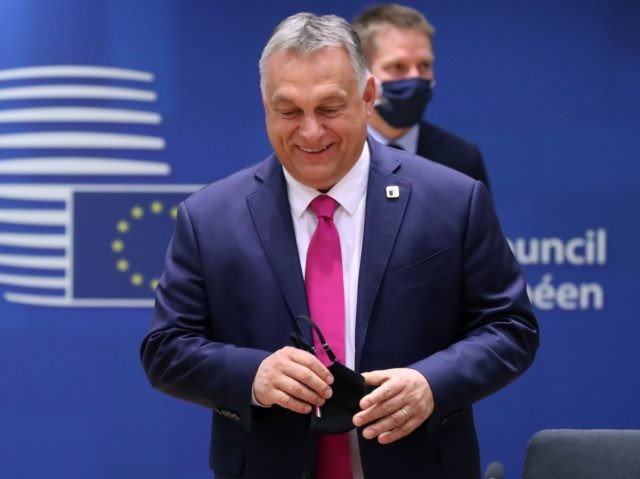EU member states Hungary and Poland have followed through on their threat to block the continental power bloc’s seven-year budget, after Brussels attempted to push it through with conditions the populist nations said were akin to “political enslavement”.
European Union rules mean that many significant decisions — including whether to approve the bloc’s seven-yearly funding programmes — must be taken unanimously, with any single member state able to veto decisions. This safeguard was triggered on Monday by conservative-led Hungary and Poland, who blocked the progress of the €1.8 trillion (£1.6 trillion, $2.1 trillion) ‘Multiannual Financial Framework’ (MFF) as an attack on national sovereignty.
Polish Leader: EU Won't 'Blackmail' Poland Into Giving Up Values, Surrendering Sovereignty https://t.co/VFyLlGegcA
— Breitbart London (@BreitbartLondon) October 17, 2020
Until now, the distribution of EU funds has been based largely on economic considerations, with the poorest European states receiving the most and the richest — countries like Germany, the United Kingdom, and France — paying the most. Under the proposed new system, if nation-states defied orders from the European Union, or were judged to not be toeing the line on issues such as migrant redistribution, funding could be easily withdrawn.
Germany’s Katarina Barley, who serves as the European Parliament’s vice president, summed up the intention behind the new rules succinctly when she said in October that misbehaving EU members should be “starved financially” into submission.
While the long-debated conditions attached to the new European budget were couched in very specific and even anodyne language — characterising the requirements as “rule of law” stipulations, or a requirement to “respect” democratic norms — critics said the moves were an attempt to exert more direct political control over European nations from Brussels.
Speaking today, Poland’s justice minister Zbigniew Ziobro was absolutely explicit in how the plan attacked the sovereignty of individual EU members, leaving them vulnerable to the will of other states. Deutsche Welle reports that Ziobro said: “The question is whether Poland… will be subject to political and institutionalized enslavement.
“Because this is not rule of law, which is just a pretext, but it is really an institutional, political enslavement, a radical limitation of sovereignty.”
“‘Allocation’ or ‘quota’, to change the name is not enough. Hungary is against it. The basic approach is still unchanged. They [the Commission] would like to manage migration, and not to stop the migrants. The Hungarian position is stop the migrants.” https://t.co/12qmBhIb18
— Breitbart London (@BreitbartLondon) September 27, 2020
Hungary’s Viktor Orban, for his part, said “nothing is agreed on until everything is agreed on” — a reference to the fact that the workings of the European Union mean Hungary was powerless to stop the new rules being added to the budget, so was left with no choice but to block the whole budget, as is its right. Hungary Today reports Orban as saying the law would lead to “politically motivated financial sanctions” and that ultimately the way that EU rulings are implemented in Hungary has to be up to Hungarians, and Hungarians alone.
The new conditions, which have been tirelessly promoted by hardline Eurofederalists like anti-Brexit campaigner Guy Verhofstadt, come after years of disagreements between more populist-minded European nations like Hungary and Poland and the Eurocratic elite in Brussels, which skews distinctly towards globalised multilateralism. Refusal of the nations to cooperate in European Union-wide migrant resettlement programs, and defining marriage as a union between a man and a woman, have caused considerable anger.
A major stumbling block for the European Union in their criticism of the Hungarian and Polish governments is how popular they are in their respective home countries. Orban was an anti-Communist activist when the country was still behind the Iron Curtain, and his government won a third consecutive term in a landslide election in 2018 and is among the most domestically popular governments in Europe.
A similar story is true in Poland. When the ruling Law and Justice party came to power in 2015 it had the largest mandate of any party in the country since the fall of Communism, and it was re-elected last year with an even larger vote share.
Some have responded to the blocking of the budget by attacking leaders like Orban directly, including Verhofstadt who claimed a “corrupt power grab” by the elected leader.
Britain’s left-wing mainstay The Guardian reported similar remarks by Green MEP Rasmus Andresen, who called Poland and Hungary “autocratic” regimes and said they were holding “Europe and Covid hostage for his failed policies”.
Joe Biden Blasts Conservative Govts of NATO Allies Poland and Hungary as 'Totalitarian Regimes' https://t.co/WrJs7nQ5yT
— Breitbart London (@BreitbartLondon) October 18, 2020
Follow Breitbart London on Facebook: Breitbart London

COMMENTS
Please let us know if you're having issues with commenting.